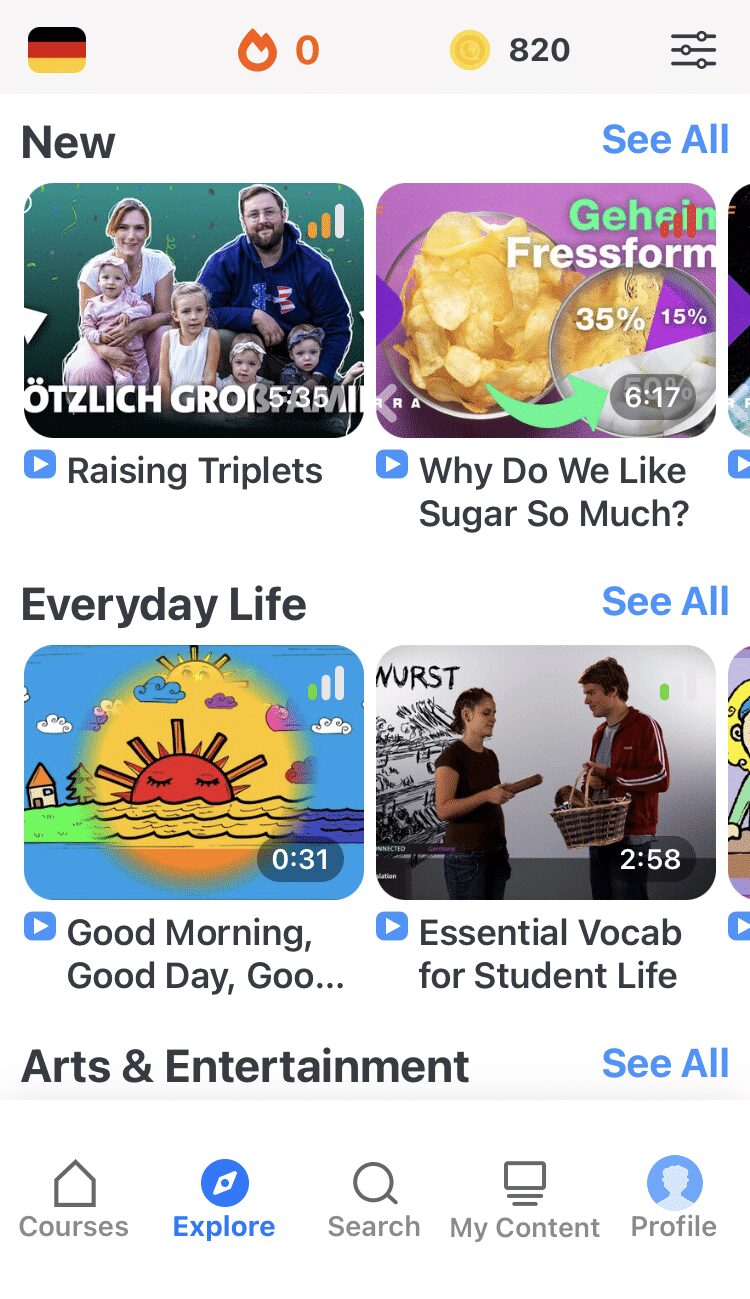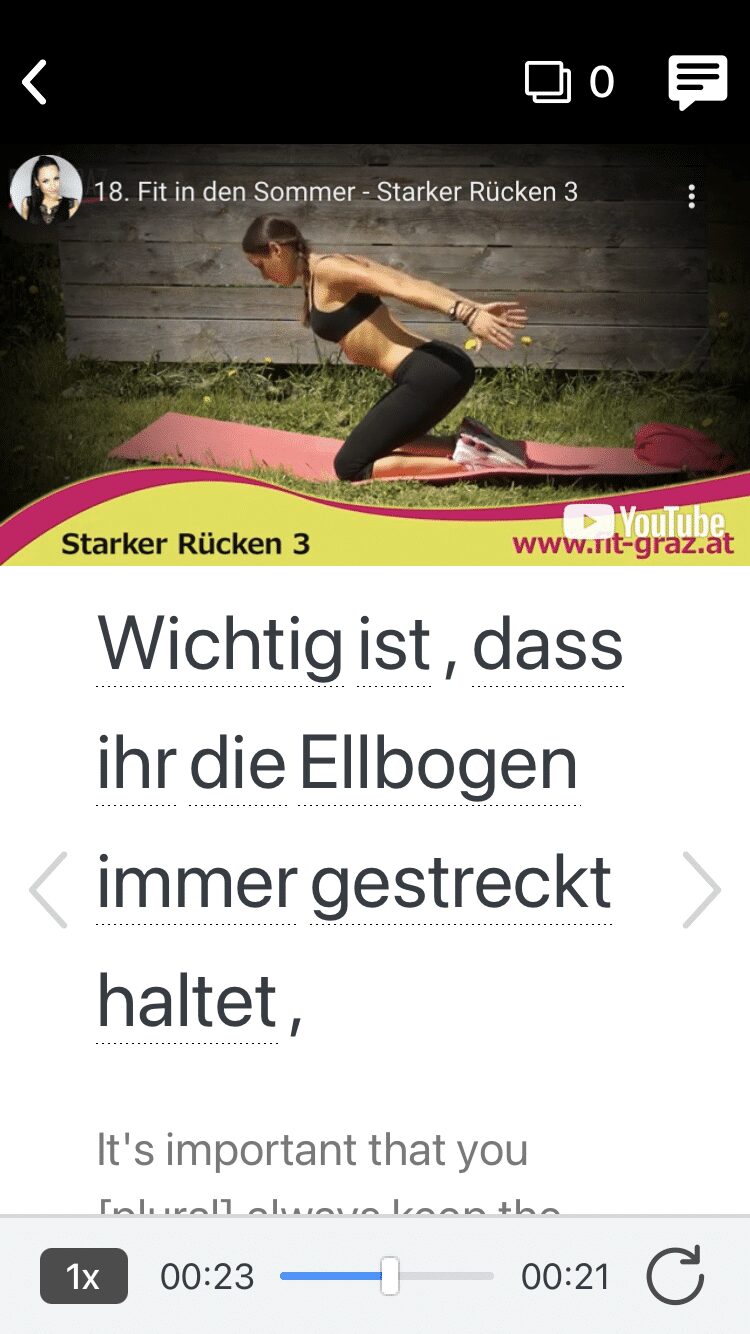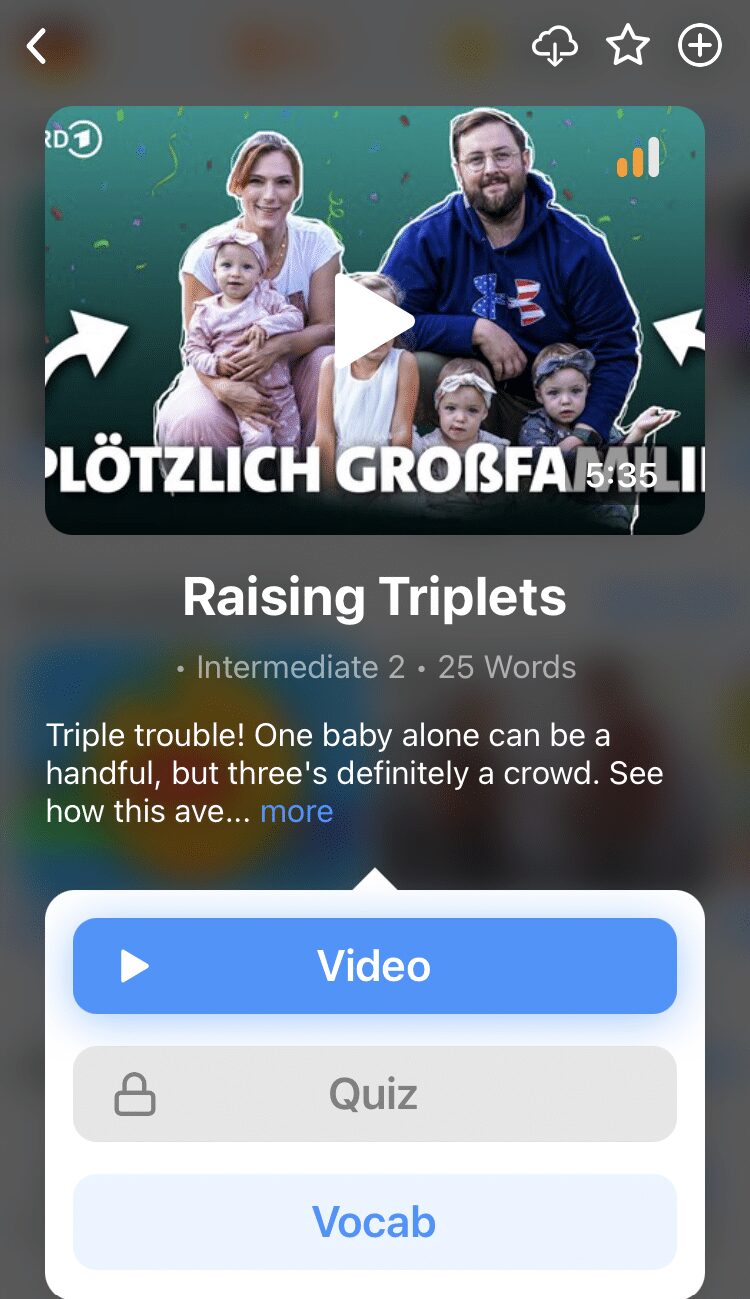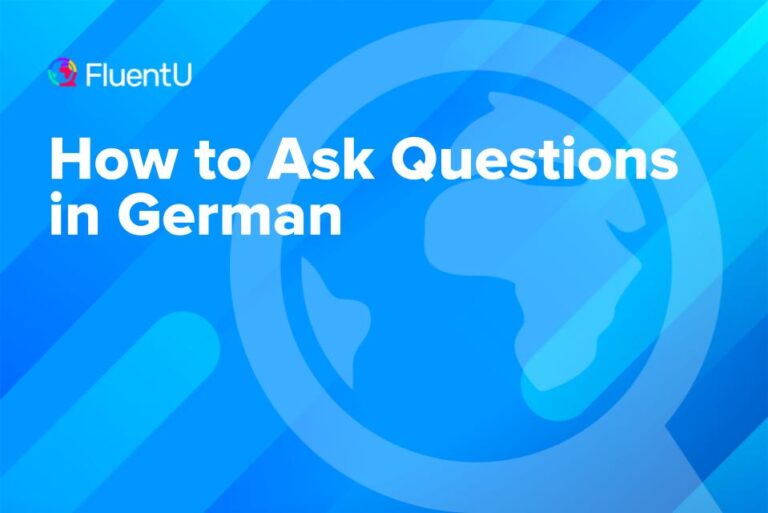70 Romantic German Phrases
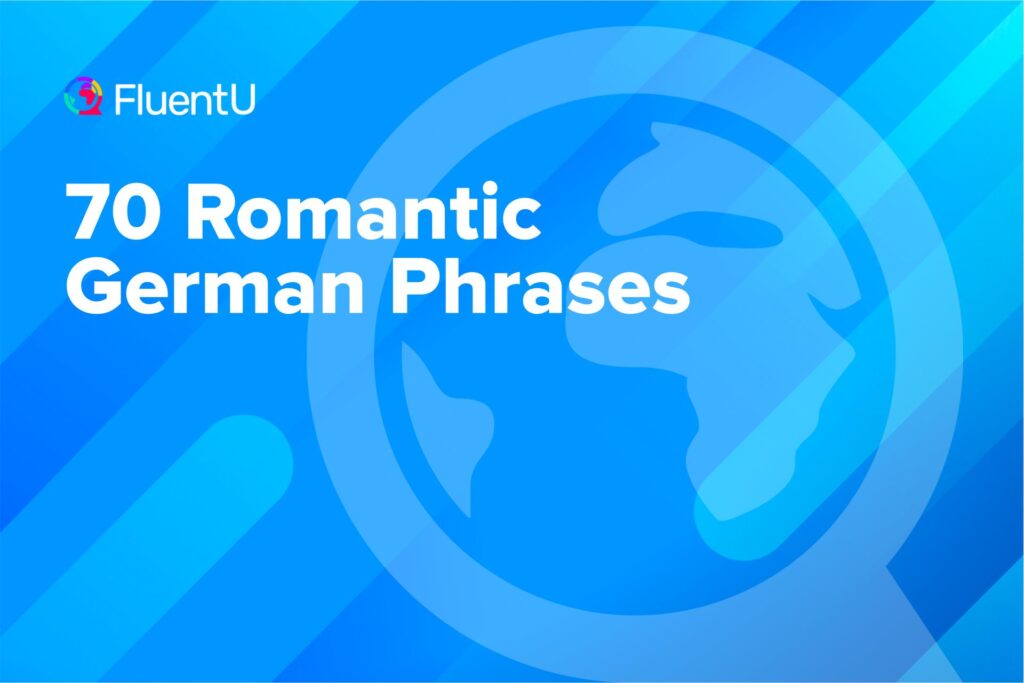
Are you ready to add a touch of romance to your German vocabulary?
In this post, we’ll explore a collection of charming and romantic German phrases that are sure to make hearts flutter. From sweet compliments to poetic declarations, dive into the language of love and explore how these romantic phrases can add a spark to your conversations.
Download: This blog post is available as a convenient and portable PDF that you can take anywhere. Click here to get a copy. (Download)
Expressing Your Feelings

Ich liebe dich. (I love you.)
Of course, we have to start with these “three little words.” Just like in English, it’s common to use this phrase among close friends, family members and romantic partners.
Ich hab’ dich lieb. (Love ya.)
Phrase dictionaries and translator tools may translate this phrase as “I love you,” but it’s less formal and can be equated to something like “love ya” based on the connotation. One of its most notorious usages was in the German entry in the 1998 Eurovision Song Contest: Guildo hat euch lieb (Guildo Loves Y’all).
Ich bin bis über beide Ohren verliebt. (I’m head over heels in love.)
Literally translated, this sentence means “I’m in love until over both ears,” but then the English version of being “head over heels” isn’t the most logical either. As idioms without direct translations, their meaning is the same: you really, really love someone.
Ich bin wahnsinnig in dich verliebt. (I am madly in love with you.)
This phrase goes a bit beyond your standard expression of love. It conveys intense and passionate feelings for the person.
Ich steh’ auf dich. (I’m into you.)
This is another loosely translated idiom for what literally involves the verb stehen, to stand. It has a slightly stronger sexual connotation than simply saying you like or love something or someone, so use it with caution.
Du bist die Liebe meines Lebens. (You’re the love of my life.)
This is a more sentimental phrase and, due to its intensity, it’s not one you’re likely to hear often (unless you watch a lot of romantic movies).
Ich vermisse dich. (I miss you.)
This is a common and straightforward way to express your longing or desire to be with someone who’s not present. If your lover lives in Germany and you’re somewhere else in the world, you might have to use this one a lot.
Ich kann es kaum erwarten, dich zu sehen. (I can’t wait to see you.)
This is another common phrase that expresses anticipation and excitement to meet or see someone.
Ich will mein Leben mit dir verbringen. (I want to spend my life with you.)
You can also say “Ich möchte den Rest meines Lebens mit dir verbringen” (I want to spend the rest of my life with you.)
Ohne dich kann ich nicht leben. (I can’t live without you.)
This is an intense phrase used to express that life feels incomplete without the presence of the person. You’ll probably hear it more often in dramatic romance movies than in real life.
Ich kann mir keine Zukunft ohne dich vorstellen. (I can’t imagine a future without you.)
This is a romantic phrase you can use to express the importance of a special someone in your future plans.
In deinen Armen fühle ich mich geborgen. (In your arms, I feel safe.)
Another phrase that sounds like it came straight out of a romance novel or love song, this one conveys a sense of security and comfort when embraced by the person.
In deinen Augen sehe ich meine Zukunft. (In your eyes, I see my future.)
Use this phrase if you want to express that you envision a future together with someone, but in a poetic way.
Mein Herz schlägt nur für dich. (My heart beats only for you.)
Another poetic phrase, this one can be used to express that your love and affection are reserved exclusively for the person you say it to.
In deiner Gegenwart fühle ich mich vollkommen. (In your presence, I feel complete.)
This is an extremely romantic phrase to convey that being with the person makes you feel whole and content. Just remember, you’re a whole person on your own, too!
German Compliments

Du hast wunderschöne Augen. (You have beautiful eyes.)
This phrase works equally well as a sweet compliment to your significant other and as a pick-up line in the club. As usual, it’s all about the context.
Deine Augen sind wie Sterne am Himmel. (Your eyes are like stars in the sky.)
You may want to use this line in your next love letter. You can make other complimentary comparisons such as “Deine Augen sind wie funkelnde Edelsteine.” (Your eyes are like sparkling gems.)
Du bist einfach wunderschön. (You’re just beautiful.)
This is a simple yet heartfelt compliment to express your admiration for someone’s beauty.
Mit dir ist die Welt schöner. (The world is more beautiful with you.)
This is a more romantic way to compliment someone’s beauty or the contribution they make to the world.
Deine Freundlichkeit ist ansteckend. (Your kindness is contagious.)
This is a nice way to recognize someone’s warm and caring nature and the impact it has on those around them. It can be used with anyone you feel comfortable enough with to compliment.
Du bist meine bessere Hälfte. (You’re my better half.)
This is a common expression across various languages, and is often used to introduce a spouse or significant other: “Sie ist meine bessere Hälfte” (She’s my better half).
Du bist das Beste, was mir je passiert ist. (You’re the best thing that ever happened to me.)
This is one (very romantic) way to express your appreciation for the profoundly positive impact someone has had on your life.
Du machst mich glücklich. (You make me happy.)
This is a simple way to express your appreciation for someone and can be used with anyone who brings you joy.
Du bist mein Seelenverwandter/meine Seelenverwandte. (You’re my soulmate.)
If you believe in the concept of soulmates and think you’ve found yours, this is how to express it to them. When referring to people, German nouns will change depending on whether you’re talking about a man or a woman. So use Seelenverwandter and Seelenverwandte for that special man or woman in your life respectively.
Du bist mein Ein und Alles. (You’re my everything.)
This is a powerful declaration of love expressing how important someone is to you.
Du bist meine ganze Welt. (You’re my whole world.)
Similar to the previous phrase, this one expresses a deep level of affection and signifies that the person holds a significant place in your life.
Du bringst Licht in mein Leben. (You bring light into my life.)
This is a nice way to acknowledge that someone brings happiness and joy to your existence.
Du bist mein Sonnenschein. (You’re my sunshine.)
This is a cute way to compare someone’s radiant presence to the warmth and brightness of the sun.
Du bist mein Herzblatt. (You’re my sweetheart.)
Here’s an example of using a term of endearment to express affection and love. You can replace Herzblatt, which literally means “heart leaf”, with any of the pet names found below.
Du bist der Grund, warum ich lächle. (You’re the reason I smile.)
This is another way to acknowledge that someone brings happiness and joy to your everyday life.
Du bist mein Traummann/meine Traumfrau. (You’re my dream man/woman.)
If you’ve found what you would consider your dream partner, good for you! Let them know with this romantic phrase.
Mit dir ist alles besser. (Everything is better with you.)
This is a nice way to emphasize the positive impact someone has on your life.
Du bist mein größtes Glück. (You’re my greatest happiness.)
This is another way to describe someone as the source of your utmost joy and contentment and can be used with romantic partners, children, etc.
Du bist der/die Einzige für mich. (You’re the only one for me.)
This phrase emphasizes the exclusivity and uniqueness of your love for the person. You might need to use it with a jealous lover. Remember to use der for your special guy, and die for your special gal.
Du bist der Grund, warum ich an die Liebe glaube. (You’re the reason I believe in love.)
While maybe a bit sappy, this phrase conveys that the person has restored your faith in love and its power.
Du bist mein Glücksbringer. (You’re my lucky charm.)
Use this phrase if you feel that someone is a source of luck and good fortune in your life.
Asking Someone Out

Willst du mein Freund/meine Freundin sein? (Do you want to be my boyfriend/girlfriend?)
Depending on the context, the word Freund can mean either a platonic male friend or a boyfriend, and Freundin can mean either a platonic female friend or a girlfriend. However, if you’re directly asking someone to be your Freund/in, the context is clear.
Willst du mit mir gehen? (Do you want to go out with me?)
This informal question refers to dating someone, either in the sense of simply going on a date or having a relationship. Nena, of 99 Luftballons fame, used it as the title of one of her songs and her 13th album. It’s also the title of this song by Daliah Lavi from 1971.
Kann ich dich zum Abendessen einladen? (Can I invite you to dinner?)
This is a more specific and romantic way of asking someone out for a dinner date.
Hättest du Lust mit mir einen Kaffee trinken zu gehen? (Would you like to go for a coffee with me?)
This is a casual and popular invitation for a coffee date, a common choice for getting to know someone.
Ich würde gerne mehr Zeit mit dir verbringen. (I would like to spend more time with you.)
This phrase is an indirect way of expressing your interest and desire to spend time together, leaving the invitation open-ended.
Hast du Pläne für das Wochenende? (Do you have plans for the weekend?)
This is a good conversation starter to gauge the person’s availability and potentially suggest a date idea. It can also be used with coworkers, friends and other acquaintances.
Lass uns einen Spaziergang im Park machen. (Let’s take a walk in the park.)
This is a casual and relaxed invitation for a stroll, allowing for conversation and connection in a natural setting.
Würdest du gerne mit mir ins Kino gehen? (Would you like to go to the movies with me?)
Here’s a classic and popular date invitation to go to the movie theater together.
Lass uns etwas Spaßiges unternehmen. (Let’s do something fun.)
This is an engaging and interactive way to ask someone out, involving them in the decision-making process and ensuring a fun and enjoyable date.
Hast du Lust, demnächst mal was zusammen zu unternehmen? (Do you feel like doing something together soon?)
If you want to keep it casual, here’s an open-ended invitation to spend time together without explicitly using the word “date.”
Hättest du Lust, mal mit mir einen Ausflug zu machen? (Would you go on a trip with me?)
This is a more adventurous and exciting invitation, suitable for those looking for a longer and more immersive date experience. It’s probably best suited for someone you’ve at least gone on a few dates with.
Ich finde dich sehr sympatisch und würde gerne mehr über dich erfahren. (I find you very friendly and would like to learn more about you.)
Here’s a compliment-filled statement expressing your interest in getting to know the person better, setting the stage for further interaction.
Ich würde mich freuen, wenn du mit mir zum [insert event or place] kommen würdest. (I’d be delighted if you’d come with me to [insert event or place].)
This is a polite and formal way of extending an invitation to a specific event or place, showing your interest in spending time together.
You can get a better sense of when to use these romantic phrases by watching native German speakers use them in authentic media with a program like FluentU.
FluentU takes authentic videos—like music videos, movie trailers, news and inspiring talks—and turns them into personalized language learning lessons.
You can try FluentU for free for 2 weeks. Check out the website or download the iOS app or Android app.
P.S. Click here to take advantage of our current sale! (Expires at the end of this month.)
Pet Names

Schatz (Treasure)
While you may not hear these German pet names often, they can be used to address your partner with affection. This is one of the more commonly heard terms of endearment, similar to “sweetheart” or “darling.”
Liebling (Favorite/Darling)
This is a sweet term used to refer to a loved one, emphasizing their special place in your heart.
Süße/Süßer (Sweetie)
This is a popular and affectionate pet name, similar to “sweetie” in English. It conveys fondness and tenderness. Use Süße and Süßer for that special girl or special boy, respectively.
Hase (Bunny)
Pet names that refer to animals are very common in German. This one is especially playful and endearing as it compares the person (typically a female) to a cute and cuddly bunny (although in other contexts, Hase usually means hare). The diminutive form, Häschen , can be used with small children.
Maus (Mouse)
Another animal-related one, this cute and affectionate pet name evokes a sense of gentleness and adorableness. It’s often used by men when addressing their wives or girlfriends. Again, the diminutive form, Mäuschen , is used for children.
Bärchen (Little bear)
This is a tender nickname, comparing the person (typically a man) to a cuddly and protective bear, symbolizing strength and affection.
Kuschelbär (Cuddle bear)
This is a playful and warm nickname, suggesting the person’s cuddly and huggable nature and invoking feelings of comfort and closeness.
Sonnenschein (Sunshine)
This nickname conveys brightness, warmth and the person’s ability to bring joy and happiness into your life. It’s typically used for cheerful people who laugh and smile a lot.
Engel (Angel)
This is a sweet term of endearment, highlighting the person’s purity, beauty and goodness. It can be used with romantic partners or well-behaved children.
Herz/Herzchen (Heart/Little heart)
This is a sweet and intimate nickname that expresses love and endearment, emphasizing the person’s place in your heart. Herzchen is the diminutive form, often used with children.
Schnuckel/Schnucki/Schnuckelchen/Schnuckiputzi (Cutie)
These are all variations of a German pet name used to emphasize someone’s cuteness (there’s no direct translation, but “cutie” is probably the closest thing). They can be used with children, family members, close friends or significant others.
Prinz/Prinzessin (Prince/Princess)
These pet names may come across as a bit cheesy or exaggerated, but you may hear them used between particularly romantic couples.
Schnecke (Snail)
You’re probably wondering why the German word for “snail” is on a list of pet names. Strangely enough, this word is used as slang to refer to an attractive woman.
More Phrases for Dating in German

Kann ich dich umarmen? (Can I give you a hug?)
This is a respectful way to ask someone for their permission before you go in for a hug. Beyond romantic situations, you can use it if a friend is feeling down or even when meeting someone new such as your partner’s parents.
Kann ich dich küssen? (Can I kiss you?)
If you want to kiss someone but also want to be respectful, this is the question to ask. Make sure you’re feeling mutual chemistry before taking the risk.
Möchtest du tanzen? (Would you like to dance?)
If you happen to be at a party, club or dance, get out there on the dancefloor by extending this invitation to someone.
Willst du mit zu mir kommen? (Do you want to come with me to my place?)
If the date is going well and you want it to continue, you could ask this question. It’s important to consider the context, relationship and comfort level of the other person before using this one.
Kann ich deine Telefonnummer haben? (Can I have your phone number?)
Be prepared to accept any response to this question, as some people don’t like sharing personal information with people they don’t know well.
Bist du Single? (What’s your relationship status?)
This phrase is a direct and straightforward way to inquire about someone’s potential romantic availability. Again, remember to approach the question with sensitivity and respect for the person’s privacy.
Ich würde dich gerne wiedersehen. (I’d like to see you again.)
This phrase conveys your interest and intention to meet again. You can use it at the end of a date that’s gone well if you sense the feeling is mutual.
Ich würde dich gerne besser kennenlernen. (I’d like to get to know you better.)
Use this expression to express your interest in spending more time with someone and learning more about their thoughts, interests and experiences.
By reviewing these phrases, you’ll be able to recognize them in the world around you and even use some yourself.
So study hard, and viel Glück (good luck) with your German romantic endeavors! And hey, if it doesn’t work out, consider reading this post on how to say “I miss you” in German.
Download: This blog post is available as a convenient and portable PDF that you can take anywhere. Click here to get a copy. (Download)
And One More Thing...
Want to know the key to learning German effectively?
It's using the right content and tools, like FluentU has to offer! Browse hundreds of videos, take endless quizzes and master the German language faster than you've ever imagine!
Watching a fun video, but having trouble understanding it? FluentU brings native videos within reach with interactive subtitles.
You can tap on any word to look it up instantly. Every definition has examples that have been written to help you understand how the word is used. If you see an interesting word you don't know, you can add it to a vocabulary list.
And FluentU isn't just for watching videos. It's a complete platform for learning. It's designed to effectively teach you all the vocabulary from any video. Swipe left or right to see more examples of the word you're on.
The best part is that FluentU keeps track of the vocabulary that you're learning, and gives you extra practice with difficult words. It'll even remind you when it’s time to review what you’ve learned.
Start using the FluentU website on your computer or tablet or, better yet, download the FluentU app from the iTunes or Google Play store. Click here to take advantage of our current sale! (Expires at the end of this month.)

